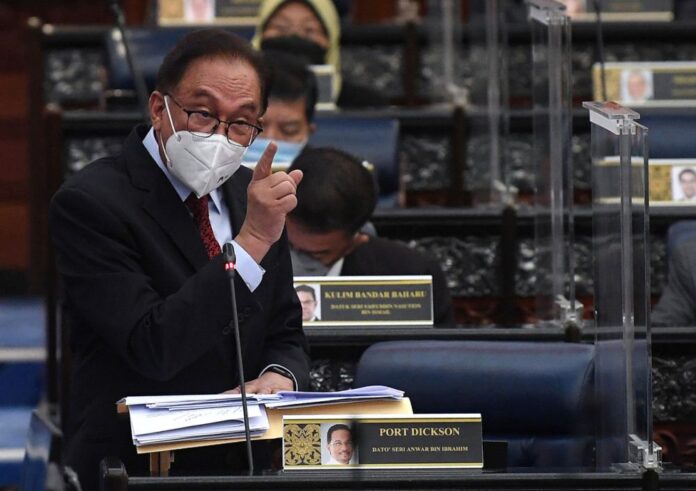Anwar suggested that that the projection could be skewed if the average figure was obtained by including billionaires and the hardcore poor as part of the test group. — Bernama pic
KUALA LUMPUR, Sept 28 — The government should relook at the feasibility of actually achieving its target to raise the average household income to RM10,000 by 2025, as stated within the 12th Malaysian Plan (12MP), Opposition Leader Datuk Seri Anwar Ibrahim said in Parliament today.
When debating the 12MP that was tabled by Prime Minister Datuk Seri Ismail Sabri Yaakob yesterday, Anwar said the targeted figure may lift the mood for some, but he wanted to know if it was realistic considering the current global Covid-19 economic scenario.
“If we refer to the numbers, the numbers for poverty, the number for retrenchment, and given that the rate of development that is expected to be slow at least for the next one to two years, we are worried whether such a statement can be seen one that is realistic or not,” he said.
Anwar, a former finance minister, suggested that that the projection could be skewed and result in inaccuracy if the average figure was obtained by including billionaires and the hardcore poor as part of the test group.
“That is why I am more agreeable if the Economic Planning Unit highlights the actual situation of the hardcore poor granularly, instead of making a blanket summary,” he said.
Anwar voiced further scepticism on the government projection, pointing to a recent statement from the Employees Provident Fund showing 46 per cent of its contributors above the age of 55 have savings of less than RM10,000.
“Are those with savings of less than RM10,000 in the next four years, suddenly able to increase their income?
“I really hope statements like these are given more thought,” he said.
Laying out Malaysia’s five-year roadmap yesterday, PM Ismail Sabri said the government aspires to raise the average household income to RM10,000 by 2025 to make the leap into becoming a high-income nation.
The 12MP also aspires for gross domestic product (GDP) growth of up to 4.5 to 5.5 per cent per annum between 2021 and 2025, while reducing the GDP per capita gap between the Central Region and Sabah to a 1:2.5 ratio, and 1:1.2 for Sarawak by 2025.
Anwar also asked the government to explain how districts that were from oil-producing states were listed as the poorest under the 12MP.
The Port Dickson MP said these districts in Kelantan, Sarawak, and eight particularly in Sabah, brought into question the effectiveness of previous policies and the representatives themselves.
“It is interesting because these three states are oil producing states, and they are named as those which are in a very worrying state.
“Are these things tied to the carelessness and neglect of programs, projects, and implementations at the federal level and state government level?
“One question that has to be raised by our friends in Sabah is whether these are the effects of just the inability of the federal government or the failures of the representatives at the federal level,” Anwar said.


